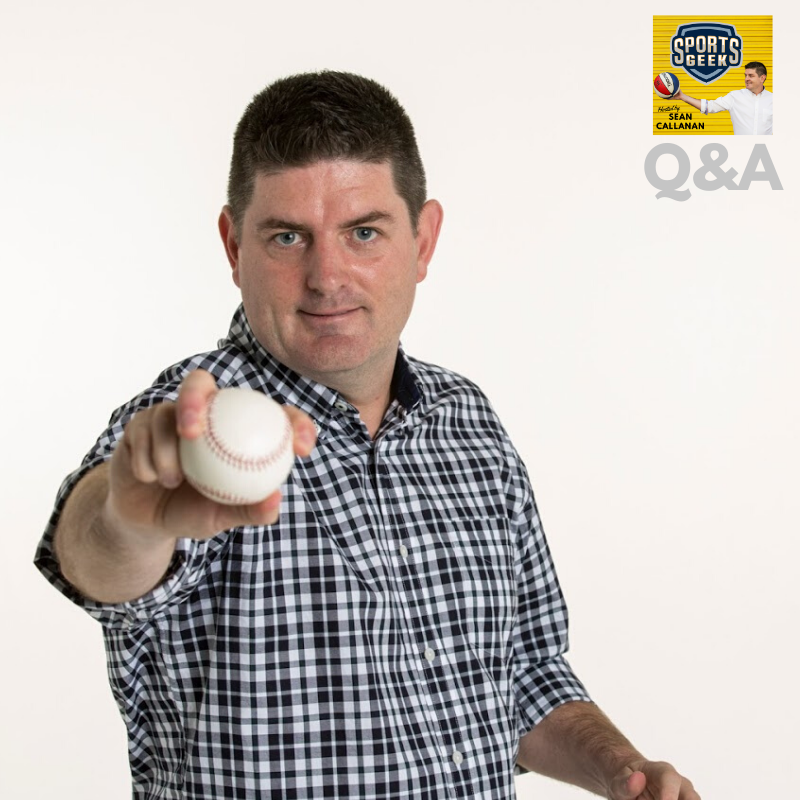On this Sports Geek Q&A episode Sean Callanan answers the following questions:
- What is your setup for podcasting? Daniel
- I'll ‘throw' one out there. Having played professional sports at the highest level and now involved in the technology side of it, I am curious how it (technology) will tap into the emotion of the athlete/eSports player in real-time? I think that people are naturally curious about emotion during pressure situations. It's one of the first questions that the media asks, “how does it feel?”, “what were you thinking?”, “what was going through your mind?” Jimmy Serrano former MLB Pitcher with Marlins
- What do you think of 49ers seasons tickets that include food items? Natalie
Listen to Sports Geek Q&A for the answers
Can't see podcast player? Click here to listen
Read Sports Geek Q&A answers below
Question 1 today comes from Daniel, who's actually asking me about what I'm actually holding right now. What is your setup for podcasting?
So 250 odd episodes in. I started off with a blue yeti, which is a USB microphone that that held me in good stead for probably 50 to 80 episodes, I think. But the best bit of kit that I've got that I'm currently recording this episode on is the zoom. Page six. It's real trust trusty piece of kit is quite mobile, is able to to take on the road and record podcast from actually to take it on the road and actually do record them as opposed when I take it all the way to America and I record a podcast. The great thing is it does have four output microphone outputs, so I can have multiple people line and get different tracks. Yeah, and like I said, quite portable. It is a little bit battered now. I got a headband around to keep the battery door in place thanks to the TSA staff who decided to dismantle it at Dulles Airport once. But it is still it is still keeping on. So yeah, I really highly recommend the Zoom 6 if you'll do anything in audio. Obviously you can use it connected with a video camera and the like. Yes, a zoom age six is great for it. For a podcast. For podcast recording. I'm recording on a Shure SV200 mike microphone. I'm not an audio guy, I do audio so I don't really know which is a good mike. So don't take recommendations from me when I'm testing out. Mike's always do an audio sample and then send it to my guy James, who's part of my setup for podcasting James Ede my podcast editor over in London, does a terrific job making these sound terrific and removing any any any problems that may exist in background or low levels and those kind of things. I send those podcasts to him via via Dropbox. They get sent back. We use Auphonic as a means to clean it up top and tail. Put the cover art on it. Put the metadata that Apple requires like titles and all of those kind of things. Auphonic. Quite good. I use that and I use it early on to like level things out. But I don't need to do that with James. But it's a nice little tool to if you were bothered to I guess home grown, your own podcast can put a top and tail on and cover art and those kind of things. And created in the format you want see when an MP 3 in the end with the appropriate compression, so it's not too big. So use or phone ink and often it then sends it to libs in. So Lib scene is and has been my podcast host for six years now. So the reason you host your podcast with a specific podcast host like Libsyn is that you don't want the drain of the resources of multiple people from an from Apple or Android. Podcasts, devices, pulling down those empty files. And if those empty three files are slow, it does affect your ratings. In the podcast stores of the world. So yeah, that's that's my podcast. That's my that's my setup for the podcast Daniel. I hope you appreciate that.
So this one came from linked in from Jimmy Serrano, who is actually a former MLB pitcher. He was pitcher with the with the Marlins. He threw this one out here, having played professional sports at the highest level, are now involved in the technology side of it. I'm curious how it technology will tap into the emotion of the athlete/esports player in real time, I think people are naturally curious about the emotion in pressure situations. It's one of the first questions the media asks how does it feel? What are you thinking? What was going through your mind? Great question, Jimmy. And it is it is a constant question of the sideline reporter. I actually do think. I do think that I think the tech is developing. We're seeing brain tracking and tech that like Muse and headbands for for meditation and those kind of things. So we're starting to see that tech that's doing some thing in that space. So like whether it's measuring brainwaves or activity and those kind of things as stress levels and that kind of stuff. So I don't think with that far away from a from a wearable that that might be able to be doing those kinds of things. But then the second piece of the I guess the equation is something that currently with that broadcasters and sports high, high performance sports tech guys are currently struggling with or it's something I actually spoke with Bo Westover at Catapult about is, you know, who has rights to that data and is that data? Is there a problem sharing that data with with the public broadcasters as an example or even just outside the team environment? Because it has competitive advantage. So I think that's probably where it's more an ethical dilemma around that. But is there something that we can record and share in the same way that heartbeat is shared for F1 drivers and those kind of things? And we've seen the Telstra tracker here in here in Australia report how a heartbeat of players is there better line for goal. So is there a metric or a or a made up term that sort of can measure stress or something like that? I think there is potentially for that where we see something that says it should be a stressful situation. But, you know, Steph Curry's at the line and you know, his heart rate and all of those things are actually low. And so sort of effectively being able to define, you know, someone that is ice cold and in their in their winter big situations there. So it is interesting. I think there's no doubt that I think we'll be able to track it. I think he'll be tracked first by coaching staff and high performance staff. And then I think it'll be the broadcasters fan engagement piece where people will start to go, what do we do it in real time? You know, I think we're seeing real time mechanical stuff. So we're seeing stuff in a sports of how fast people are clicking the keys. And again, heart rate and reaction time and those kind of things. I think we'll continue to see those things in the mechanical space. Recently, there's a there's a cricket bat, a technology that's that's just going to introduce this summer with a sticker that's on the bat that's going to effectively report on the bat speed and the timing of the of the of the batsmen hitting the ball, those kind of things. So whether we can come up with something in that space, that'll be the question. And I think then the other parties, I guess the ethical moral issues of what does that what do these devices, what will they show? Will I show someone with high anxiety or having a panic attack and those kind of things? And how much does that creep into you? Patient doctor privilege and the rights of of players. So, yeah, there's my answer. Oh, I'll flick you this episode back on LinkedIn. Jimmy, appreciate your question and I'd love your your take on my answer. Thank you very much.
Question 3 This one comes from a recent news article from Natalie. She asked, What do you think of the 49ers season ticket plan that's going to include food items? Yeah, I really like this idea. You know, I think the people at Levi's Stadium, Al Guido, who's been on the podcast before, would have run the numbers. Levi's always trying to innovate in what they can do for their fans. They had a lot of insight ordering early on with the app, but they didn't see a lot of take up on it. So it always takes a little bit more. And then I think the other part is the cost of going to a game does add up. You buy your season ticket and and that is, you know, not an insignificant amount of money. But then if you are going and you are buying food and hotdogs and those kind of things, it can. It can add up. So I'm sure Al Guido and his team of have run the numbers to to make sure that it's still going to be profitable. But also, it's really important that the fans feel like having a great experience and it's a really big benefit to them. So I think it's another method of. Of engaging fans, that's not technology, you know, and we've seen other sports venues like in Atlanta where they've effectively desperately discounted the concessions as a fan engagement strategy. So I think this is just an extension of that and rolling it up into the value piece of being a season ticket holder. So I think there'll be a few more a few more teams following suit. But I think what you have to do is actually run the numbers. And it's you have to make sure that that it makes fiscal fiscal sense rather than just saying, yes, this will do it. This will keep renewals because it wasn't really about renewals. They said they had good renewals. It was about providing more value to their to their fans.
Send in your question
sean AT sportsgeekhq.com
+61 407 047 200

Pick my brain
Want some help on a campaign, sponsorship or content but don’t know where to start? Book a time with Sean Callanan for a Pick My Brain session.
The Pick my brain session is a two-hour video consulting session where you can get Sean’s thoughts and opinions on ticketing or sponsorship campaigns, campaign development and digital content review.








